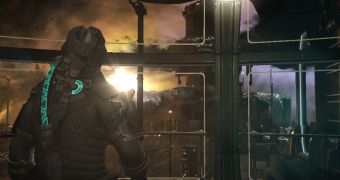At its core Dead Space 2 is a game about killing monsters with ever more powerful weapons while waiting to be surprised by the scares that the developers peppered throughout and worrying about how to develop your weapons and armor.
But Dead Space 2 is also, in some ways, a tale about the triumph of science over obscurantism, about how hard truth and its applications in the real world can challenge and then defeat radical belief systems and their impact on the world and its inhabitants.
Isaac Clarke might be named after Asimov, who provided the first name, and Arthur C. Clarke, both giants of science fiction, both of them leaning towards its more “hard” current, but the first name is also linked to Newton, the man that lead humanity in one of the greatest leaps when it comes to physics and the way knowledge can be expanded.
He is a hero of technology, using it, as an engineer, in its most applied form, ready to see the world around him as more than a place that needs to be navigated while avoiding or killing some pretty tough enemies, but as a place governed by certain immutable laws that allow him a space where his own actions can determine his destiny.
The weapons and the “powers” that Clarke can use have backstories that link them to the engineering medium, even if some of them come across as heavy handed (see the telekinesis and the numerous panels that seem to be there just so it has a use in the game).
And apart from being tech based, Clarke also looks at the whole situation he finds himself in through the eyes of a researcher, testing hypothesis about what is happening to him before deciding what's real and what not (something which the first Dead Space did a bit better).
Dead Space 2 is a celebration of science and technology in a medium that seems to always be on the cutting edge of , and we should praise it for that as much as we do for its scares and battles.

 14 DAY TRIAL //
14 DAY TRIAL //